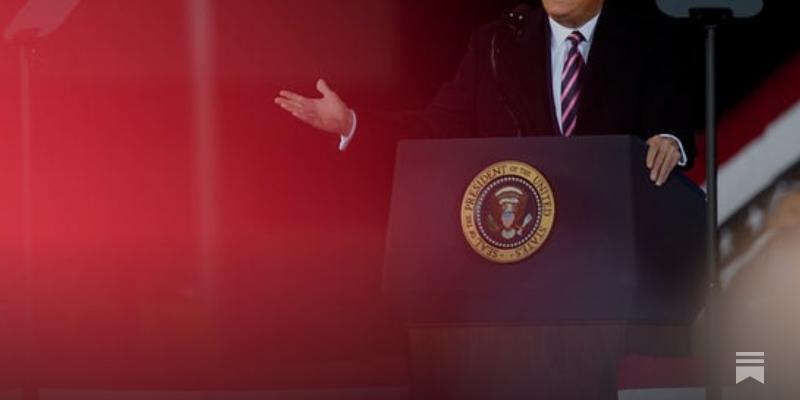Trump's 'Virtues' and Other Fairy Tales
By: Gabriel Schoenfeld



Sad, sorry, sickening sycophantism from the Claremont Institute board chairman.
FOLLOW THE MONEY. That phrase—a legendary Hollywood screenwriter's addition to the Watergate lore—turns out in fact to be excellent advice for an investigation. And if one is investigating how the Claremont Institute, the California-based think tank, came to be such a hotbed of Trumpists and Trumpism—think about such notorious Claremont fellows as Michael Anton (whom I wrote about here) and John Eastman (whom I wrote about here), and Victor Davis Hanson (whom I wrote about here), on whom Claremont bestowed its annual statesmanship award—following the money is a useful strategy.
One major source of Claremont's money is Tom Klingenstein, chairman of the institute's board of directors and its biggest individual funder. Klingenstein is a partner in the Wall Street investment firm Cohen Klingenstein, which manages a portfolio worth around $2.5 billion, according to its most recent Security and Exchange Commission filing. IRS figures compiled by the Guardian show that Klingenstein has donated more than $19 million to the Claremont Institute since 2005, with a $2.97 million donation in 2021, his most generous contribution to date.
In addition to being a money man, Klingenstein is also (as he puts it) "a philanthropist, public speaker, writer, and a playwright." His 2017 play, If Only, staged in New York's Cherry Lane Theatre, explores, he says, a "fictional interracial love story with Abraham Lincoln playing the role of matchmaker." ("No actors come off well," and "full of heavy-handed metaphor," was how the New York Times panned it.)
Klingenstein is also one of the Claremont Institute's intellectual impresarios, having put out a multipart presentation in 2021 about America's "cold civil war" and "the existential threat of the woke regime." It is just as reasonable, measured, and temperate as you'd imagine.
Then, in 2022, Klingenstein delivered an encomium titled "Trump's Virtues." He was arguing—two years before the presidential primaries, mind you—that the best candidate whom the Republican party could put forward would be Donald Trump.
Trump, Klingenstein said,
was born for the current crisis: the life and death struggle against the totalitarian enemy I call "woke communism." The "woke comms" clench the Democratic party by the scruff of its neck. They tell us lies and silence those who challenge the lies. Like most totalitarian regimes, they have a scape goat [sic] (white males).
Trump, he continued, "is a manly man." (I swear I am not making this up.) "In present times, when manhood is being stripped of its masculinity, traditional manhood, even when flawed, has much appeal." And so on and so forth, in a gusher of praise, some of it veering into the homoerotic, some into the sadistic: Trump, that pillar of manliness, "smoked rats out of their hiding places" and "ripped apart people he thought were weak." (What the hell?)
Now that Trump has the nomination in hand, Klingenstein is back. The sequel—creatively titled "Trump's Virtues Part II" (text, video)—was posted on Klingenstein's personal website last week and has been repeatedly promoted by Trump himself on his Truth Social account.
Klingenstein argues that, now that Trump is the de facto GOP nominee, it is time for Republicans to fall in line behind him, including those "who doubt him or even can't stand him." This is an urgent matter, for "we are in a war, fighting an enemy of revolutionaries that kick and spit on America." Trump, Klingenstein tells us, "grasps the essential things. . . . He is a fighter—bold, brave and decisive" and "the most towering figure of our time," an essential commander-in-chief in "a contest between those who love America and those who hate it." A satirist attempting to depict an extreme Trumpian lickspittle would be hard pressed to outdo these Klingensteinian droplets.
One of Trump's greatest qualities, Klingenstein says, is that he "hates his enemies every bit as much as they hate him." And these enemies happen to also be "America's enemies." Trump's "natural appeal," you see, "has created everyday patriotic Americans into an army." Trump has proven that he will go after his enemies, including especially those in the deep state, "without pity or compassion." Lincoln, Klingenstein reminds us, spoke of Americans as the "almost chosen" people. The possibility of Trump's re-election "gives us hope that the God who has never forsaken his 'almost chosen' people will not do so now."
Well.
Since Klingenstein invokes Lincoln, let's start with the Great Emancipator. "With malice toward none; with charity for all; with firmness in the right, as God gives us to see the right, let us strive on to finish the work we are in; to bind up the nation's wounds," are the words with which Lincoln closed his Second Inaugural. Could there be a starker contrast to the seething hatred—"without pity or compassion"—emanating from Klingenstein's lips and pen? Even Trump himself, as vile and violent as is his own rhetoric, seldom goes so far. Instead of the healing tones of Lincoln we are given a taste of the "friend-enemy" distinction that is the essence of Carl Schmitt, the Nazi philosopher now making a comeback in some circles on both left and right.
In his infamous "Flight 93" article, published in the Claremont Review, Michael Anton inveighed against "the ceaseless importation of Third World foreigners with no tradition of, taste for, or experience in liberty." Klingenstein's gist is much the same. One of the essential things Trump grasps, says Klingenstein, is that American culture is "exceptional, and that's the way we want to keep it. And we won't keep it if we usher in millions of immigrants with cultures different from our own."
Call me old-fashioned or naive, but I prefer Emma Lazarus's view:
Give me your tired, your poor,
Your huddled masses yearning to breathe free,
The wretched refuse of your teeming shore.
Send these, the homeless, tempest-tost to me,
I lift my lamp beside the golden door!
Lazarus's words famously adorn the pedestal of the Statue of Liberty. The golden door defines America.
Cloaking himself in patriotism, peddling xenophobia, pining for civil war and the devastation of "enemies," adulating with the crudest possible rhetoric the would-be authoritarian and blatant bigot who is Donald Trump, Klingenstein's sycophantic rants are about as un-American as one can get. Don't be surprised if they earn him a Presidential Medal of Freedom in a second Trump administration.
Yikes.



